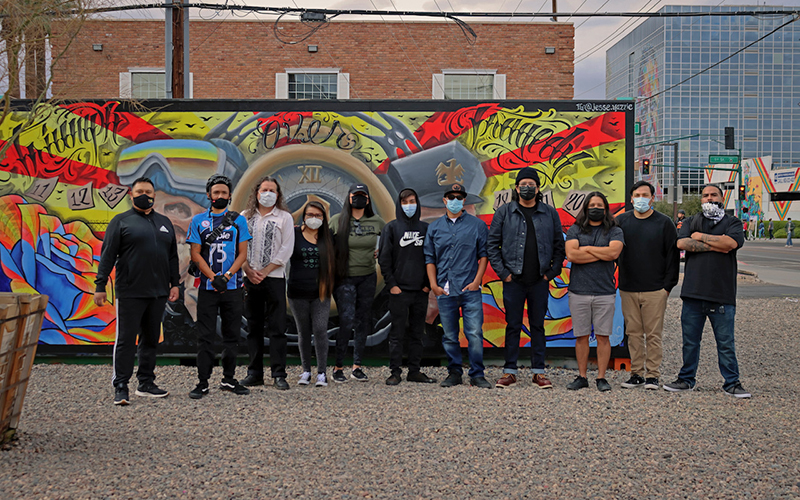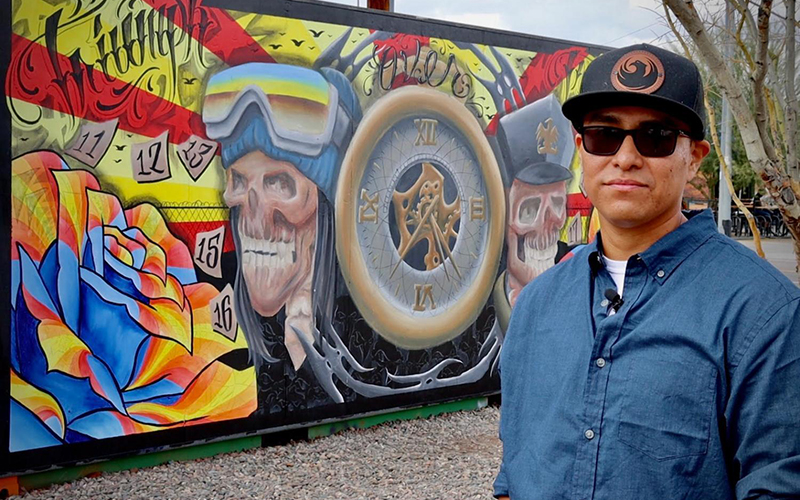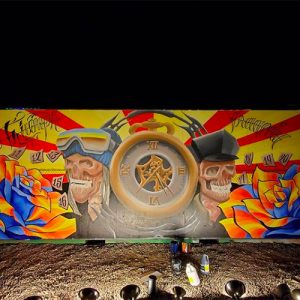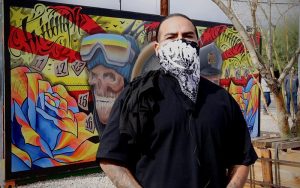
Artists and collaborators involved with UNCONTAINED, a quarterly art installation project in Roosevelt Row, include, from left, Rocky Tano, Jeremy Arviso, Oliverio Balcells, Eunique Yazzie, Melody Lewis, Jake Yazzie, Jesse Yazzie, Danny Upshaw, Brian Skeet, Paul Molina and Zachary Justin. (Photo courtesy of Roosevelt Row Community Development Corp.)

Jesse Yazzie is a Navajo artist and the first of four creatives who will exhibit their artwork quarterly on a 8X20-foot shipping container near the Roosevelt Row Welcome Center. Behind him is his mural “Triumph Over Tragedy.” (Photo by Eunique Yazzie/KJZZ)
PHOENIX – Four Indigenous and Latino artists in Arizona have been chosen to create murals on a old shipping container in the Roosevelt Row Arts District for the yearlong exhibit UNCONTAINED.
The project is sponsored by Roosevelt Row Community Development Corp. and its partner arts organizations. Navajo creative Jesse Yazzie is the first of the four to exhibit their work quarterly on an 8×20-foot container in a corner lot near Second and Roosevelt streets.
His mural “Triumph Over Tragedy” now occupies prominent space in a vibrant part of downtown Phoenix. The painting incorporates iconography from his recent time in prison and the relationship troubles and substance abuse problems that landed him there.
“The time on the clock actually is my daughter’s birthday, 5/24,” he said Saturday while pointing out a prominent component of his mural. “She was the center of my sanity, really. I had to focus on her while inside. Your mind races. And it just builds and builds and builds to the point where you have to stay positive or else you could go under.”
Yazzie, who was released four months ago, comes from a long line of creatives, and he used Indigenous symbols in the mural to honor them. For instance, within the clock is a dreamcatcher, which he said is a fundamental component of what the artwork represents: freedom from incarceration to now pursue his artistic dreams in a big way.
He’s grateful to the juried panel that chose his work.
“Roosevelt Row and the partners cooperating with them to make this possible, really helped me out big time because there’s no way I would’ve been able to do this myself, fresh out of prison,” he said.
Many of the judges for UNCONTAINED are affiliated with or run organizations that promote the voices, stories and artistry of Latino and Indigenous communities in Arizona.
Oliverio Balcells, a Latino artist of Mexican heritage who’s with Xico Arte y Cultura, served on the jury panel. UNCONTAINED is a chance to look for artists who haven’t had much exposure, he said.
“Because we have people with a lot of experience and we want people who haven’t done many murals but we want to hear the story,” he said. “We want to pay attention to what they are doing.”
Xico, which has been an arts advocate since 1975, recently repurposed shipping containers as pop-up galleries on Roosevelt, but those have been closed during the pandemic because it’s impossible to socially distance inside them. The containers are at the same site as Yazzie’s mural and will reopen when it’s safe.
But “emerging” artists doesn’t mean someone who’s 18 and fresh out of high school.
Melody Lewis, who also served on the jury panel, is of Mojavi-Tewa-Hopi descent. She started Indigenous Community Collaborative but is not a designer or artist.
“I come to this from a totally different perspective on the workforce and education side,” she said. “What I was looking at was the passion that was coming out of these applications, the stories they wanted to tell but also ones that were trying to tap into a different type of artistry and trying to tell their stories in a different modality.”

Jesse Yazzie’s mural, “Triumph Over Tragedy,” is on display until the end of March. Part of the UNCONTAINED exhibit, it’s painted on a shipping container just south of Roosevelt Street. (Photo courtesy of Roosevelt Row Community Development Corp.)
Such as photography.
Danny Upshaw, who will be the second featured artist this spring, plans to install a large photographic print on the container.
“A lot of my family is from the Navajo Reservation,” said Upshaw, who was born and raised in Phoenix. “There’s Native American creatives here in the city, but it’s kind of nice to have a little bit of a presence especially on a main street like this where hundreds of people are walking by all the time.”
One such passerby was Karen, who didn’t want to give her last name but shared her opinion about Yazzie’s container mural.
“There’s a lot of energy in a lot of the colors, and I like the sort of image of what feels like the sun rising out of the images of death in a way,” she said. “You know, it’s a tough time for everybody and we’re all trying to find that sunshine right now.”
Both Karen and her mom, Estie, are new to the Phoenix area. Estie is a painter, but she’s never used a canvass as large as a shipping container.
“I was just thinking about it the other day that I’m so comfortable with smaller pieces that I don’t know if I could,” Estie said. “Physically, it’s very hard to do something this big. You know, you have to step up on a ladder or something. I couldn’t do it.”
Zachary Justin, an Akimal O’odham artist, will follow Upshaw this summer. He said his desert abode will feature prominently in his upcoming mural.
“I stay out there in Gila River, so I’m surrounded by desert, no city,” Justin said. “The only store around is a Chevron gas station, surrounded in a bowl of mountains, basically. So there’s nothing but desert cactus, mesquite trees everywhere. That’s going to be my concept of what I’m going to be putting on this mural.”
Another juror was Eunique Yazzie (no relation to Jesse), a Roosevelt Row development board member who founded IndigeDesignCollab, which works with Native artists of all stripes to “indigenize” spaces. She said many Native people focus on seasons because they are people of the land, and that translates to the concept of the quarterly exhibitions.
“The idea is just to make creative spaces accessible for any Indigenous person at all levels,” she said. “So, with this sort of space and this sort of rotation of temporary art, we’re taking that concept of creativity and then layering it with stories behind the person that’s doing the painting, but also giving them a fresh new start.”
Yazzie, who is Navajo, also noted the legacy of Theodore Roosevelt, the 26th U.S. president, for whom Roosevelt Street is named. For her, exhibiting UNCONTAINED on what originally was Native land is a way for Indigenous artists to metaphorically take back what once was theirs.
“Roosevelt was really against Native American presence and championed laws that removed us from our lands,” Yazzie said. “For us to be in this space that honors him represents us taking it back and saying, ‘Look you tried this but we’re still here. We’re going to stay and share our stories and it’s going to be culturally related.’”

Zachary Justin is a member of the Gila River and Akimel O’odham tribes. His work will be displayed in the summer of 2021 in the corner lot near Roosevelt Row Welcome Center. (Photo by Eunique Yazzie/KJZZ)
Roosevelt, who was president from 1901-09, is lauded as a naturalist. But his political and legislative push to force Native people off their lands and to assimilate white Eurocentric culture was anything but natural.
The result, Yazzie said, “put Native children in boarding school systems and removed them from their families, separating them from their cultural beliefs and forcing them to cut their hair.”
“Now we want to see culture and, for me, that’s what Arizona is all about – the blend of 22 tribes that are in the state and how we represent ourselves together collectively,” she said.
Illustrator, graphic designer and videographer Paul Molina, an Indigenous artist from the Akimal O’odham/Pee-Posh/Gila River communities, is glad to see such prominent Native American work featured on Roosevelt Row.
“In this specific space, I believe we’re on Akimal O’odham land, the Pee-Posh, the Pima and the Maricopa tribes that are indigenous to this land. There are a lot of artists here from the Gila River Indian Community, the Salt River Community, Navajo Nation and surrounding reservations in Arizona,” said Molina, referring to those who gathered to celebrate the unveiling of UNCONTAINED last weekend. “I really believe showing Native art in this particular area does bring hope to Indigenous youth and other artists as well.”
Nicole Underwood, communications director for the Roosevelt Row development group, said the artwork is enlightening, even on an overcast day threatening rain.
“That’s the power of art, right? It captivates our sense of curiosity and self-expression. It allows us to understand different pages of people’s stories that they might have not already known. This is a prime way for people to be connected to those stories, to those artists, to those cultures.”
UNCONTAINED may be perfect for the age of COVID-19. Just like Jesse Yazzie, we’re all trying to triumph over tragedy.
The Fronteras Desk is a unique KJZZ project that covers a wide expanse of an under-covered news desert that stretches from northern Arizona deep into northwestern Mexico.